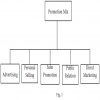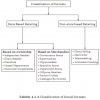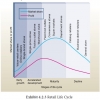MARKETING MANAGEMENT - Retailers And Wholesalers
Wholesaling - Retailers And Wholesalers
Posted On :
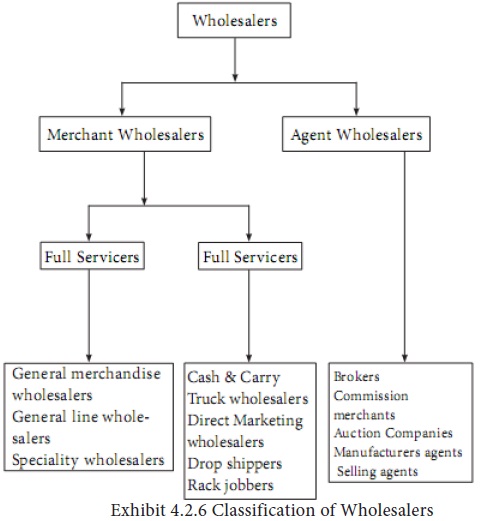
This includes all the activities involved in selling goods and services to those who buy for resale purpose.
Wholesaling
This includes all the activities involved in selling goods and services to those who buy for resale purpose. In the case of wholesaling this excludes manufacturers or producers who are involved directly in the production of the goods. They are the marketing intermediaries that buy from one source and sell it to another. The main function of a wholesaler is facilitating the transportation of the product and at times in the transfer of the titles. The intermediaries’ performing the wholesaling function is predominantly divided into two types namely merchants and agents. The difference between the two forms lies in if they take title to the goods they sell.
The classification is based on whether the intermediaries take title to the goods they sell. Taking title to the goods means the intermediaries own that merchandise and must be prepared to handle the risk associated with the ownership, including getting stuck with merchandise even if it turns out to be un-sellable
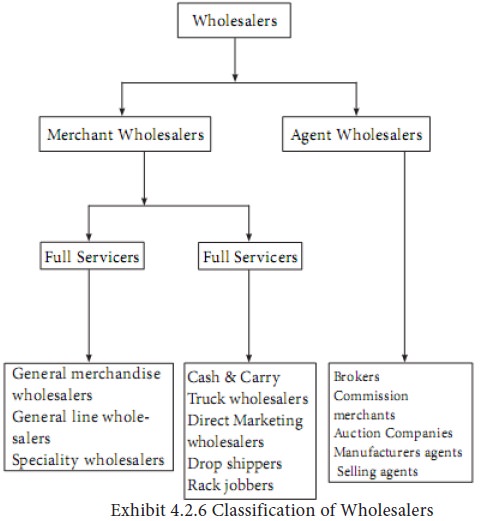
1. Cash and Carry Wholesalers are buyers who do not want certain specialized service such as delivery or credit. The wholesalers prefer the buyers to come to their warehouses and buy the products and pay for them at the same time. Metro, the German wholesaler refer exhibit 2.6.7 is a classic example for this type for this category
2. Truck Wholesalers are otherwise called the truck jobbers sell limited line of items. They operations are predominantly with the help of trucks and this helps in the immediate delivery offers. Some of the items used to be considered in this method are perishables and those which have great demand. Although this method is a expensive form of distribution this definitely a aggressive form of selling the offering
3. Drop Shippers are merchants who take title to the goods but not the possession of the goods. These merchants take orders form the buyers pass it to the manufacturers, which will, then ship the product directly to the buyer. As the product goes directly to the buyer, it minimizes in the loading and unloading of the product. This type is commonly used for commodities like cement, coal etc. The drop shippers are also called as the desk jobbers as they need minimum infrastructure. Since they do not handle the shipping, there is even no need for a warehouse
4. Rack Jobbers are another type of merchant wholesalers who contract with the retailers to set up display racks in the store and stock them with merchandise. This particular category of wholesalers gained prominence after the emergence of departmental stores
The agents are the next category of wholesalers, they take possession of the goods but at the same time they do not take title to them. The agents in no way provide warehouse facility or credits but provide facilities like arranging credit or delivery as a part of their service. The agents make business through commissions based on selling prices of the product. The percentage of the commission varies based on the industry as well on the perishable nature of the product. The agents can be classified as follows namely
1. Brokers who are intermediaries who bring the sellers in touch with the buyers and also facilitate in the contractual negotiations and receive commissions based on the work. Brokers are considered to be neutral and are found in every field. The commissions they receive from both the parties will be relatively less and this requires minimum investment. Most organizations prefer brokers because they work on commissions and do not have long-term relationships with one particular organization.
2. Commission Merchants are similar to brokers but are given certain powers by the sellers of the product. They perform majorly the pricing function and work closely with the producers of the products. The commission merchants are most common in the agricultural products. The commission merchants take possession of the goods so that the prospective buyers have a chance to inspect the products; once the deal is finalized the commission merchants deduct their commission past and return the balance to the producer. Exhibit 4.2.8 shows the homepage of a commission merchant
4. The Selling Agents are paid a commission and are expected to be familiar with the products and the markets. Unlike the manufacturer’s agents they do not restrict themselves to one particular geographical area but rather to all places where the product has got a market. Since they concentrate on a much larger scale they are given more responsibility including the elements of promotions and pricing of the products. The organizations who utilize these people are otherwise called as external marketing department
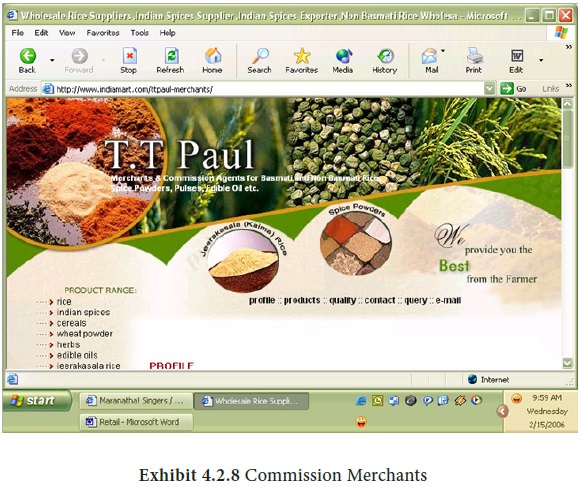
This includes all the activities involved in selling goods and services to those who buy for resale purpose. In the case of wholesaling this excludes manufacturers or producers who are involved directly in the production of the goods. They are the marketing intermediaries that buy from one source and sell it to another. The main function of a wholesaler is facilitating the transportation of the product and at times in the transfer of the titles. The intermediaries’ performing the wholesaling function is predominantly divided into two types namely merchants and agents. The difference between the two forms lies in if they take title to the goods they sell.
Classification Of Wholesalers
The classification is based on whether the intermediaries take title to the goods they sell. Taking title to the goods means the intermediaries own that merchandise and must be prepared to handle the risk associated with the ownership, including getting stuck with merchandise even if it turns out to be un-sellable

Classification Of Merchant Wholesalers
The merchant wholesalers are
independently owned concerns that take title to the goods they distribute. Some
of the merchant wholesalers operate at the national level while some of them
are more into regional levels. The merchant wholesalers are classified in terms
of the number and the types of service they provide to the customer. The major
division of the merchant wholesalers is termed as the Full-service merchant
wholesaler and Limited –service merchant wholesaler.
The Full-service merchant wholesaler provides customers with a complete array of services in addition to the merchandise they offer. The service may include delivery, credit facility, advice and even assistance as accountant aid. These people are also called as full-function wholesalers. The full-service wholesalers are further classified into three types by the line of the goods they offer.
1. General Merchandise Wholesalers are those who sell large number of different product types or lines. It would be a one stop shop for the retailers to procure things from them at a much bargainable prices
2. General Line Wholesalers are those who limit their offerings to one particular product line. They may hold all the products and variants in one particular product line
3. Speciality Wholesaler reduce the line further, they may hold only select products in a particular product line. The traders of spices can be classified under this category
The choice of being a more general merchant wholesaler or a much-specialized wholesaler depends on the choice of the target customers, whether their customers are speciality stores or a general stores
The Limited-Service Merchant Wholesaler is one who offers less than full service and charges lower prices. These types of wholesalers are also known as limited-function wholesalers. This model comes to prominence when some customers may not want or may not be interested to pay for some of the services the Full-service merchant wholesaler offers. They may prefer to sacrifice the services offered to get lower prices. As a result of this particular category has emerged. This Limited-service merchant wholesaler is further divided into five types based on the various services they try to render and the on the basis of the payment for the goods they sell.
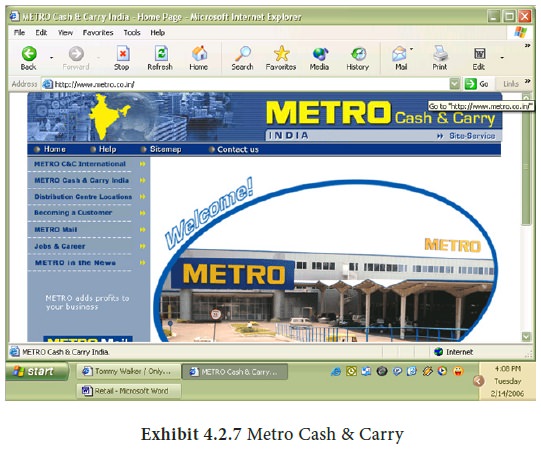
The Full-service merchant wholesaler provides customers with a complete array of services in addition to the merchandise they offer. The service may include delivery, credit facility, advice and even assistance as accountant aid. These people are also called as full-function wholesalers. The full-service wholesalers are further classified into three types by the line of the goods they offer.
1. General Merchandise Wholesalers are those who sell large number of different product types or lines. It would be a one stop shop for the retailers to procure things from them at a much bargainable prices
2. General Line Wholesalers are those who limit their offerings to one particular product line. They may hold all the products and variants in one particular product line
3. Speciality Wholesaler reduce the line further, they may hold only select products in a particular product line. The traders of spices can be classified under this category
The choice of being a more general merchant wholesaler or a much-specialized wholesaler depends on the choice of the target customers, whether their customers are speciality stores or a general stores
The Limited-Service Merchant Wholesaler is one who offers less than full service and charges lower prices. These types of wholesalers are also known as limited-function wholesalers. This model comes to prominence when some customers may not want or may not be interested to pay for some of the services the Full-service merchant wholesaler offers. They may prefer to sacrifice the services offered to get lower prices. As a result of this particular category has emerged. This Limited-service merchant wholesaler is further divided into five types based on the various services they try to render and the on the basis of the payment for the goods they sell.

1. Cash and Carry Wholesalers are buyers who do not want certain specialized service such as delivery or credit. The wholesalers prefer the buyers to come to their warehouses and buy the products and pay for them at the same time. Metro, the German wholesaler refer exhibit 2.6.7 is a classic example for this type for this category
2. Truck Wholesalers are otherwise called the truck jobbers sell limited line of items. They operations are predominantly with the help of trucks and this helps in the immediate delivery offers. Some of the items used to be considered in this method are perishables and those which have great demand. Although this method is a expensive form of distribution this definitely a aggressive form of selling the offering
3. Drop Shippers are merchants who take title to the goods but not the possession of the goods. These merchants take orders form the buyers pass it to the manufacturers, which will, then ship the product directly to the buyer. As the product goes directly to the buyer, it minimizes in the loading and unloading of the product. This type is commonly used for commodities like cement, coal etc. The drop shippers are also called as the desk jobbers as they need minimum infrastructure. Since they do not handle the shipping, there is even no need for a warehouse
4. Rack Jobbers are another type of merchant wholesalers who contract with the retailers to set up display racks in the store and stock them with merchandise. This particular category of wholesalers gained prominence after the emergence of departmental stores
Classification Of Agent Wholesalers
The agents are the next category of wholesalers, they take possession of the goods but at the same time they do not take title to them. The agents in no way provide warehouse facility or credits but provide facilities like arranging credit or delivery as a part of their service. The agents make business through commissions based on selling prices of the product. The percentage of the commission varies based on the industry as well on the perishable nature of the product. The agents can be classified as follows namely
1. Brokers who are intermediaries who bring the sellers in touch with the buyers and also facilitate in the contractual negotiations and receive commissions based on the work. Brokers are considered to be neutral and are found in every field. The commissions they receive from both the parties will be relatively less and this requires minimum investment. Most organizations prefer brokers because they work on commissions and do not have long-term relationships with one particular organization.
2. Commission Merchants are similar to brokers but are given certain powers by the sellers of the product. They perform majorly the pricing function and work closely with the producers of the products. The commission merchants are most common in the agricultural products. The commission merchants take possession of the goods so that the prospective buyers have a chance to inspect the products; once the deal is finalized the commission merchants deduct their commission past and return the balance to the producer. Exhibit 4.2.8 shows the homepage of a commission merchant
3. Manufacturer’s Agents are those who are
available for the producer who are not interested in performing the sales
activity or who lack the expertise to have one. The manufacturer’s agents work
in limited geographical areas and in low priority zones. If a producer of
electronic goods feels having a separate sales force for the rural areas is an
expensive decision they may go in for a merchant’s agent to do the job of
selling their offering. The merchant’s agents will be familiar with the area
they operate and this is one reason why producers opt for the merchant’s
agents. One another benefit of these people is that they need not be paid till
the deal is finalized.
4. The Selling Agents are paid a commission and are expected to be familiar with the products and the markets. Unlike the manufacturer’s agents they do not restrict themselves to one particular geographical area but rather to all places where the product has got a market. Since they concentrate on a much larger scale they are given more responsibility including the elements of promotions and pricing of the products. The organizations who utilize these people are otherwise called as external marketing department

Tags : MARKETING MANAGEMENT - Retailers And Wholesalers
Last 30 days 1499 views












